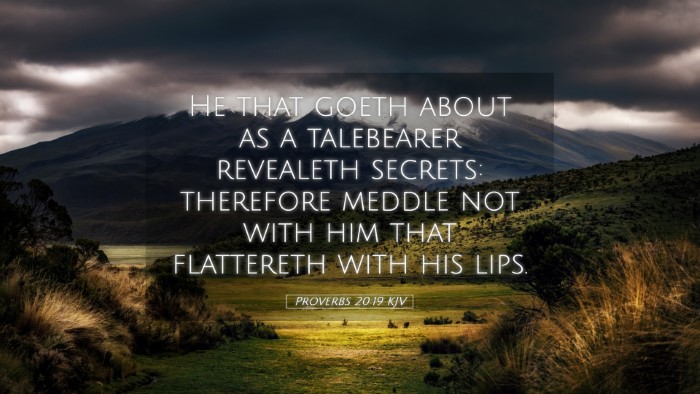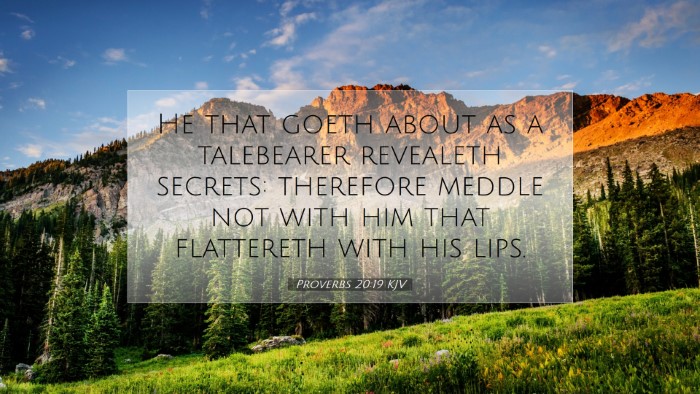Commentary on Proverbs 20:19
Verse: "He that goeth about as a talebearer revealeth secrets: but he that is of a faithful spirit concealeth the matter."
Introduction
The book of Proverbs is rich with practical wisdom and moral teachings. Proverbs 20:19 speaks directly to the dangers of gossip and the virtue of discretion. This commentary seeks to synthesize insights from prominent public domain commentaries, notably those by Matthew Henry, Albert Barnes, and Adam Clarke, to explore the implications of this verse for pastors, students, theologians, and scholars.
Exegetical Insights
Understanding the Text
Matthew Henry emphasizes that a 'talebearer' is one who indiscriminately shares information, often damaging others' reputations. In this regard, the verse warns against the folly of those who engage in gossip, which can destroy trust and community. The Hebrew term used implies a sense of betrayal, revealing private matters without consent.
Albert Barnes comments that the juxtaposition of the 'talebearer' with the one who 'conceals the matter' presents a stark contrast in character. The faithful individual is praised for their ability to keep confidences, a mark of wisdom and maturity. This fidelity is crucial in nurturing relationships within both the church and broader society.
Adam Clarke elaborates on the cultural context, noting that sharing secrets can arise from a lack of self-control and a desire for social capital. He suggests that wisdom involves not just refraining from gossip but actively protecting the integrity of others, which aligns with the ethical standards set forth throughout the Wisdom Literature.
Thematic Exploration
1. The Nature of Gossip
Gossip is characterized as a social behavior that undermines community. It serves no beneficial purpose and is often rooted in pride and self-interest. The biblical narrative warns against such behaviors, suggesting consequences that extend beyond individual relationships to the health of the community at large.
2. The Virtue of Discretion
The verse highlights a positive trait: the individual's ability to preserve confidentiality. This discretion is seen as a hallmark of a faithful spirit. As Henry and Barnes suggest, the one who conceals matters fosters trust and builds stronger societal bonds.
3. Ethical Implications
This scripture challenges the reader to consider their own speech and interactions. Are we protectors of each other's reputations? Or do we find ourselves inadvertently contributing to harmful narratives? The ethical call is to embody the spirit of fidelity in our communications.
Practical Applications
- For Pastors: Consider establishing church policies or teachings that emphasize the importance of confidentiality. Encourage an environment where congregants feel safe sharing personal matters without fear of gossip.
- For Students: Engage in discussions about the impact of words in social settings. Explore the implications of this verse in academic contexts where information can be misconstrued or misused.
- For Theologians: Delve deeper into the theological ramifications of gossip as a sin against societal norms and divine law. Assess how this verse correlates with other scriptural admonitions regarding speech and conduct.
- For Scholars: Utilize this verse as a case study in communication ethics within religious texts. Analyze historical interpretations and their relevance in contemporary society.
Conclusion
Proverbs 20:19 encapsulates essential truths about human relationships and the character of individuals. The admonishment against gossip and the commendation of discretion calls for thoughtful reflection and practical living. As we strive to embody the principles found in Scripture, let us aim to be known not as talebearers, but as faithful stewards of the truth, fostering trust and unity wherever we go.


